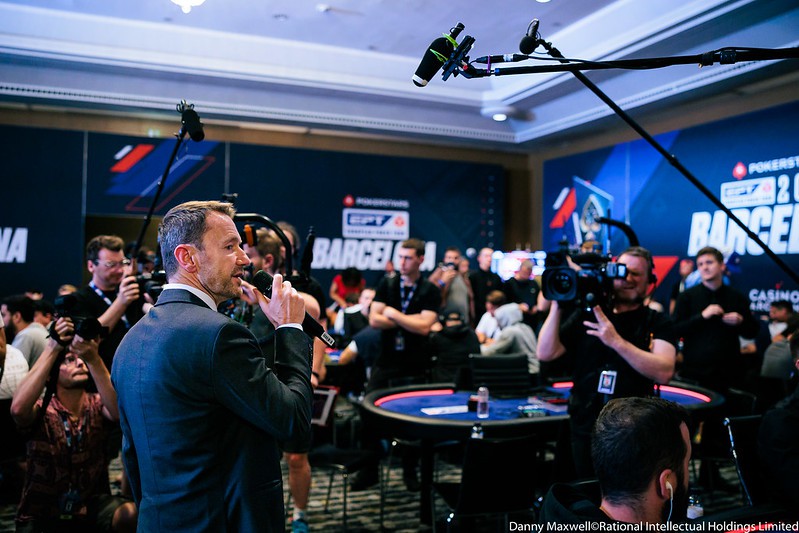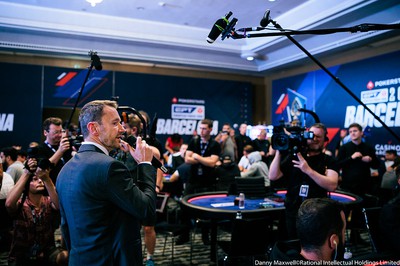

On the eve of the 20th Anniversary of PokerStars European Poker Tour Barcelona and on the heels of the recent controversary at the WSOP Main Event Final Table where supporters in the audience were using computer software to advise one of the players while playing heads up for the title, the EPT announced a set of rule changes, one of which was to better address the use of solvers during play at the tables.
With the controversy garnering so much attention, the impact of technology on poker advancing at a rapid pace, and game integrity being of the utmost importance, the EPT added the following rule:
Players are not permitted to use at the table or anywhere in the tournament room area at any time game theory optimal (GTO) solver software, GTO charts (whether used on an Electronic Device or otherwise) or any AI tool or similar algorithmic software that is capable of affording the user a competitive advantage in the Tournament. We also don’t allow any spectator to make any use of electronic devices with solvers inside the poker tournament area.
In an attempt to alert the public to the new rule which will be in force at EPT events moving forward and to foster transparency and open dialogue between tournament organizers and players, we took some time to sit down with EPT Tournament Director Toby Stone to discuss these important advancements in tournament poker rules.
The following interview has been edited for brevity and clarity.
Mike: So the first thing that I wanted to talk to you about was the rule changes. Let’s start with the GTO changes.
Toby: Obviously, as years go by, this has become more and more of a problem. The software and apps are getting easy to use, and these kinds of apps do offer a competitive edge.
So our initial rule was that the players can’t have it at the table. We’ve had that now, probably for about a year. And then obviously with what happened at the WSOP caused a bit of a big scandal. So we’ve reviewed that policy now, and our general thoughts are that you shouldn’t be getting any real time help while you’re playing.
Mike: So what does real time help mean?
I think for the most part, players will respect the rule and they won’t try to push the boundaries.
Toby: That means when the clock’s running, your sat at the table, and while you’re playing. If you’re on a break, then obviously you can do what you want.
So while you’re playing, you shouldn’t have any kind of competitive edge from this kind of software, and that also means going to the rail in between hands and even talking to a backer, getting real time help. It breaks the one player to a hand rule.
Even though it’s not at the table during that game, we’re just going to take it a step further and we’re going to say that while the clock is running, it should be one person one hand.
And no real time help either – here at the table, at the rail, from your friends.
Mike: So is it realistic that players would go to the rail and not get help? Is there anything short of sequestering the final table that can be done?
Toby: Sure, there will be some challenges with enforcing it. Some things are going to be easier to spot than others. Going to the rail and having a chat with a backer. Sure, there’s probably not much we can do about that. But what we can do is if players are going to rail and they have a computer, this we can see and this we can try to fix, have a chat with the players.
I do think, for the most part, that players will be happy with the rule. The players that I’ve spoken to, they’re like, “fair enough, we get it.”
So I think for the most part, players will respect the rule and they won’t try to push the boundaries. There’ll still be some, that ask us some tough questions, which, you know they’re tough questions. That’s fine. We have plenty of tough questions we have to answer.
But I do think for the most part players will respect it, and especially in those important moments of the tournament, the final tables when the money is really high, I think it’s a lot easier for us, so I’m happy with the change.
I think I think it’s better for the poker economy on a global scale, and I think it’s better for Poker to have something like this there in the wording.
Mike: You included charts as well. Has that been a problem, or is that more of a preventive measure?
Toby: Yeah, I think it’s really more of a preventive measure, just trying to spread the net wide and just say, “don’t use these things”.
We had a player the other day that had an app, and he was putting in his hands. I think it was more of a hand history app rather than some kind of GTO app. We have no idea and we can’t really be taking their phones and checking things. We can’t really be doing that. So we’ll try to spread the net wide a bit, try to just discourage any type of use of any type of software or information on paper or in an app.
Like I said, there’ll be some challenging moments where it’s like, Are we over stepping here? Is this OK? It’s not OK. But we have that all the time with other rules. It’s not going to be the only one.
Mike: Will that stop players from taking notes, for example?
Toby: So the player the other day, using the app… We basically said to him, If you want to write this stuff down, go ahead, no problem to write it down. Taking notes. I’m OK with that as long as it’s not electronically.
Mike: OK, fair enough. What are the penalties?
Toby: Well, there’ll be the usual penalties. Penalties escalate. So it will be a chat, “Please don’t do that.” We’ll explain why, we’ll explain our policy.
If they continue to do it, then we’ll just start with escalating penalties. One hand, two hands, one round, two round, three rounds. And we can in any moment skip one of those escalating penalties depending on how they’re acting.

Mike: Are you happy with the language as it exists currently? Or was that more of “Let’s get something in for this next tournament and we’re going to think more broadly about it”?
Rule number one means we can do pretty much anything we want, not in some kind of authoritarian way, but in the best interests of poker.
Toby: It’s a new thing. and we’re probably not going to get it right the first time. Hopefully, with time as we get more feedback as different things happen, we may have to word things differently. So for now, I’m OK with it. It probably will need change and at some point in the future.
Mike: Are you interested in commenting on how the WSOP handled the Main Event Final Table controversy?
Toby: I think the WSOP have different challenges than we do. They obviously have a lot more staff, a lot more dealers. They have so much more going on.
For me to have a good team of floor and dealers, I think it’s definitely easier. I obviously have much less than them. They have thousands of dealers, hundreds of floor tables all over the place, but having said that, it was the Main Event Final Table.
I don’t know where the floor were. I don’t know, I’ve heard some things, but I don’t want to comment on that because that’s hearsay. But a few things could have happened. Either the floor wasn’t paying attention, that can happen right? It can happen to me sometimes.
Or, the floor didn’t know how to deal with it. You know, it’s a final table. It’s a lot of pressure. Perhaps, someone was maybe nervous to go to the table and say, “hey, stop doing this” and be challenged because it’s not really a written rule somewhere, but we have rule number one.
Rule number one means we can do pretty much anything we want, not in some kind of authoritarian way, but in the best interests of poker. And for me that would have covered that situation.
You know, go to rail, read it and say, “This is not right, put your computer away,” and I think that the players would have respected it.
So I think it’s one of those things that it was either a weak floor that didn’t know how to handle the situation, or they weren’t there, or potentially they didn’t care.
Mike: There was a lot of questions being floated around at the time of whether or not the player had recourse, or if there was liability with the tournament staff for not properly enforcing rules. Do you think that is a situation that you ever encounter, or that weighd in the back of your mind when making ruling?
Toby: I mean, it’s a little bit like a referee in a football match, right? The ruling is the ruling, and it’s too late. Once it’s over, there’s no way to go back. There really is no recourse. Sometimes incorrect rulings are made. Everybody has done that, including me. And there’s no recourse. There’s not really much you can do about it. It has to be accepted at the time.
From a player perspective, they can try to go to the highest authority in that moment. But once the moments passed, I think it’s too late.
Mike: Is there any concern on your part with gaming regulators in a particular jurisdiction when enforcing rules?
So to keep the game alive, keep it fun and exciting, and to attract new players, I would advise players to come in, be friendly at the table, be nice to the dealer, and play your game in a timely manner.
Toby: So, yeah, we obviously mostly work in Europe, in different jurisdictions where each area, each country has different rules.
So France, for example, has a lot more stronger rules than Monaco. Obviously, from an integrity perspective, we have our own internal procedures and rules that we always follow. I’ll give you an example.
In Paris, every table has to have a camera. By law they are recorded, have to be kept for so long, and only certain people have access to it. So it depended on where we go. Things will change a little bit on regulations.
In Europe, France is the toughest. The dealers have to be licensed. They have to have police checks – which I don’t disagree with largely So some events are slightly more challenging than others.
Mike: Is there anything that you would like to get out there, a message you would like to get to the players?
Toby: I’m probably kicking or flogging a dead horse, but I would say I think stalling is becoming more and more of a problem. And I think the players should just play their game in a timely manner. When you’ve made a decision in your head, that should be when you act.
We try to attract new players to this game. Without new players, the game will die eventually. And if these kind of issues keep continuing and they get bigger and bigger, it kind of ruins the game. Then the game will become smaller basically, and I don’t really think anybody wants that.
So to keep the game alive, keep it fun and exciting, and to attract new players, I would advise players to come in, be friendly at the table, be nice to the dealer, and play your game in a timely manner.
Mike: Ok, Perfect. Thank you.
Toby: Thank you very much.

